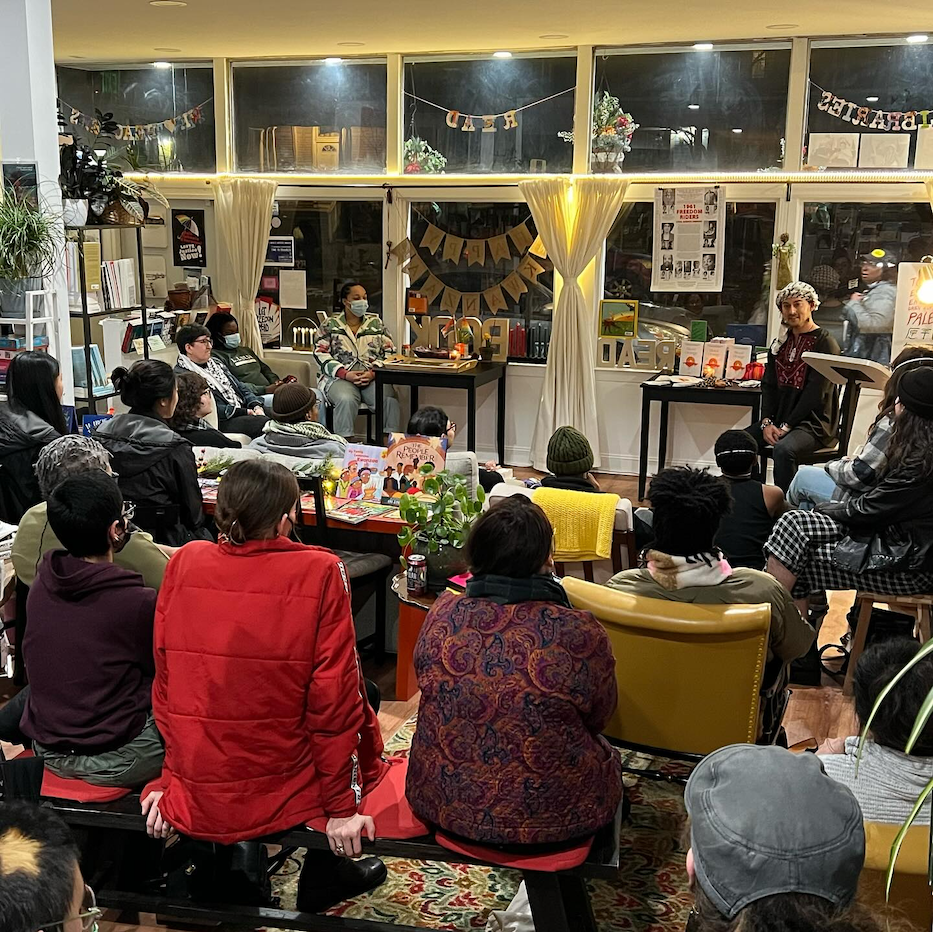
Books | Culture & Community | LGBTQ | Poetry | Arts & Culture | Possible Futures
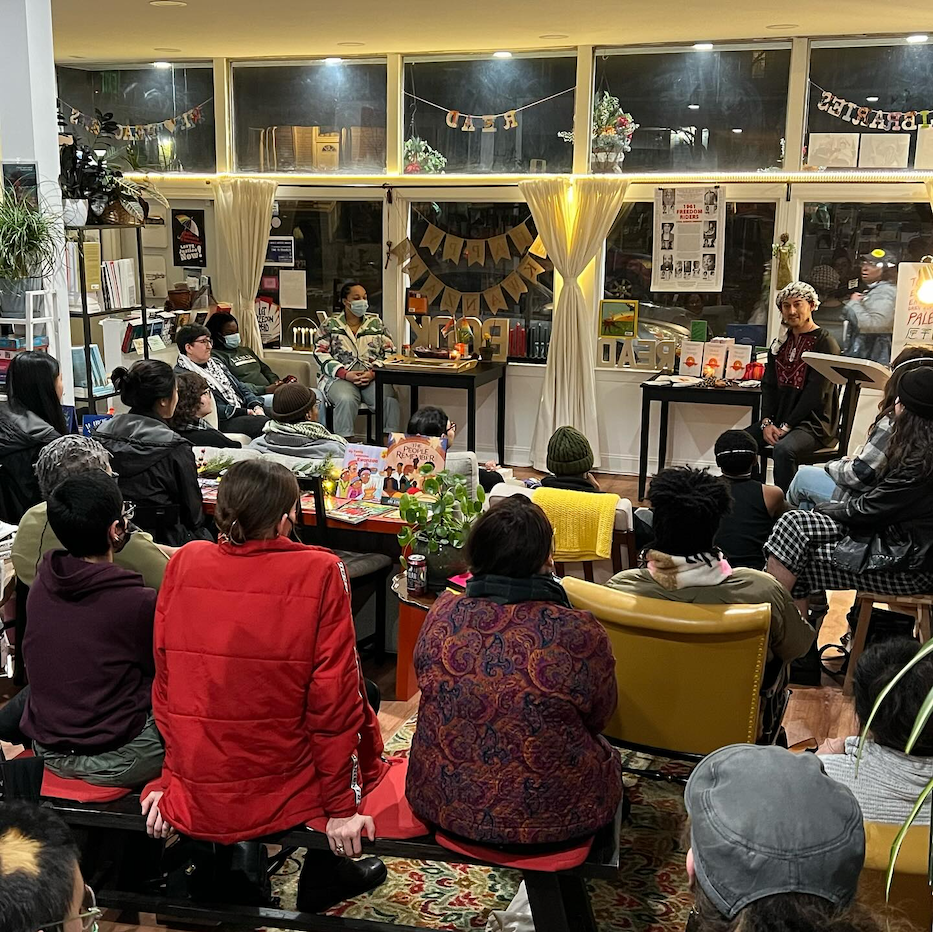
Adrian Huq Photos.
Thirty adults gathered round on couches and chairs at Possible Futures, eyes and ears turned toward the front of the room. Several of them sported keffiyehs, a traditional Arab scarf that has become a show of solidarity with Palestinians during a growing humanitarian crisis in Gaza. At the center, Mx. Yaffa steadily recited to an audience of attentive ears and hearts.
“I gaze my third eye stretching to fields of citrus and olive where blood is spilled that feels and looks like mine,” they began. “I am and am not home, for I am Palestine, and she yearns for me to taste home.”
Those words from their poem “Falasteen”—the Arabic word for Palestine—graced Possible Futures last Friday night, as PeerPride and the Edgewood Avenue bookspace came together to present the work of Palestinian American poet Mx. Yaffa and their new publication, Blood Orange.
The second stop on a three-week long book tour, the reading doubled as a conversation with the audience, pressing attendees to imagine a more just world, where grief and violence are not so constant.
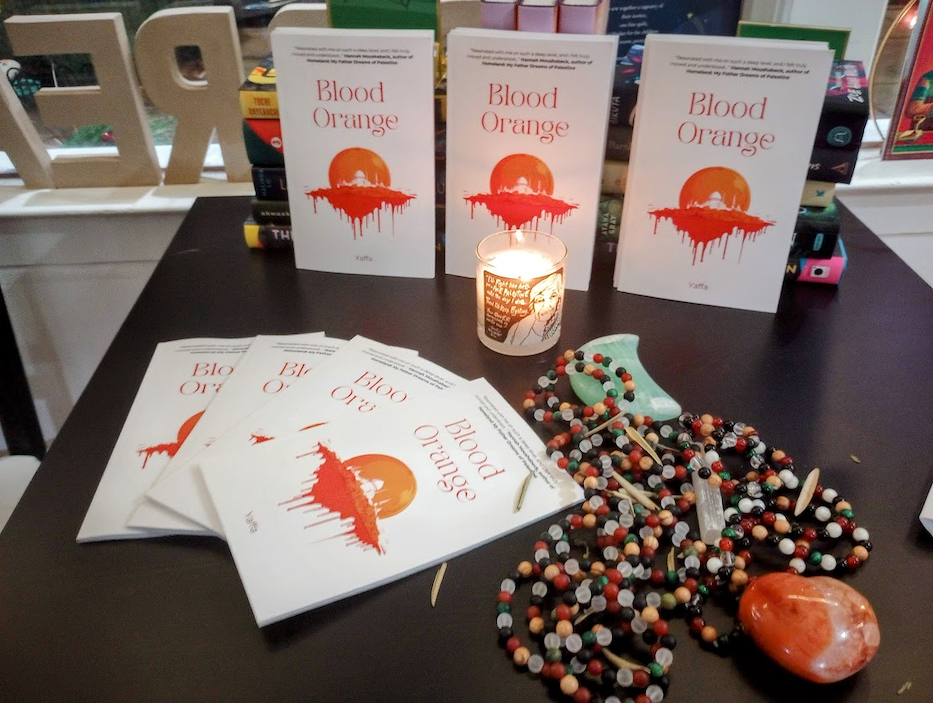
The event was hosted in collaboration with PeerPride, which houses the program Trans Haven and is led by New Havener and LGBTQ+ advocate Kirill Staklo. This visit was also a welcome back to Connecticut for Yaffa, who previously lived in the state for three years. They co-founded the Waterbury-based nonprofit Life in My Days and helped launch the Connecticut Mutual Aid network at the height of the COVID-19 pandemic. They currently reside in Oakland, California.
Outside of being a writer and poet, Yaffa serves as the Executive Director of the Muslim Alliance for Sexual and Gender Diversity. As their first book, Blood Orange traces the author's own grief while living in the Palestinian diaspora and serves as a tool for processing recent events and generational trauma through the written word.
The book confronts the anguish of being Palestinian—and living in the vast diaspora—at a time of intense loss of human life while also inviting readers to imagine pathways toward utopia. Their poems deal with topics including yearning for home, belonging, and mental health against the backdrop of ongoing displacement of and violence against Palestinians.
The title pays homage to Yaffa oranges—a fruit appropriated by the British and then by Israel, said the author—and the blood spilled as Palestinians fight for and are displaced from their land. The poet also wrote many of the poems during the eclipse weekend on October 14, when the sun appeared to have a ring of blazing orange around it.
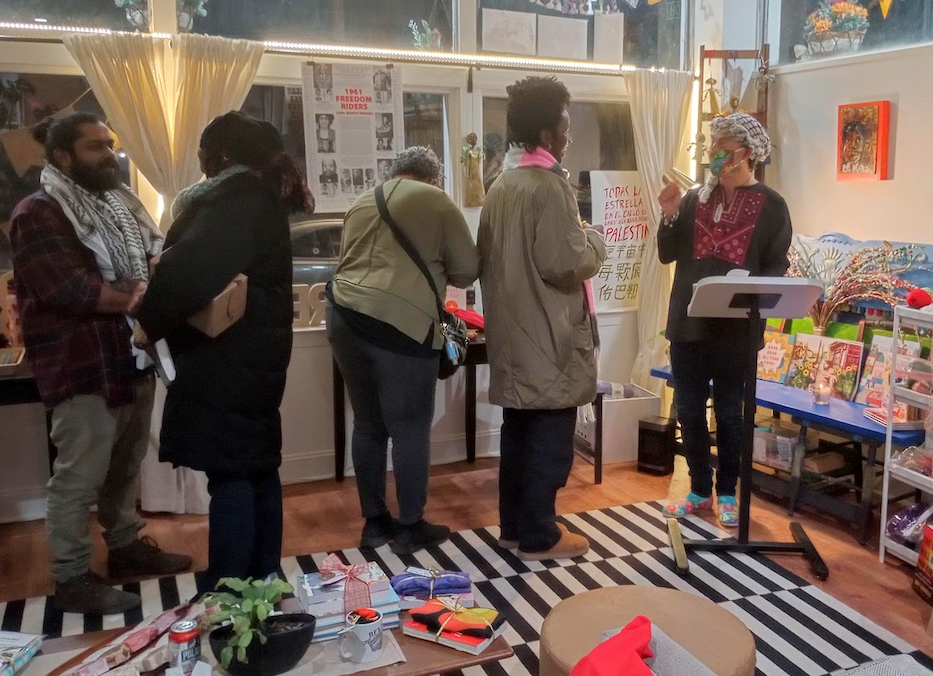
Yaffa said that they wrote the book so that other queer and trans Palestinians would both feel seen and have a safe bubble to process their emotions “without necessarily the impulse and immediate need to always feel better.” What motivates them in their advocacy for a free Palestine is not the possibility that they will get to go to and one day die in Palestine, but that future generations will not have to deal with settler violence and what they see as colonialism.
“I am of a people who have died a thousand times as white people came and conquered,” Yaffa read from the book’s titular poem. “Our blood filling trees and canyons turning the sea a blood orange like an eclipse that forgot to subside.”
Twenty-eight out of the book’s 32 poems were written after Hamas’ October 7 attacks, which resulted in the deaths of 1,200 Israelis and the kidnapping of 200 more as hostages. The event, now seen as the beginning of the Israel-Hamas war, prompted a mass militarization by the Israeli Defense Forces, and has since resulted in the deaths of over 21,000 civilians in Gaza, and a growing humanitarian aid and public health crisis. Of those civilians, almost half have been children.
Yaffa noted that the poems immediately flowed out of them, after years in which they previously had “never been able to write about Palestine until October 7.”
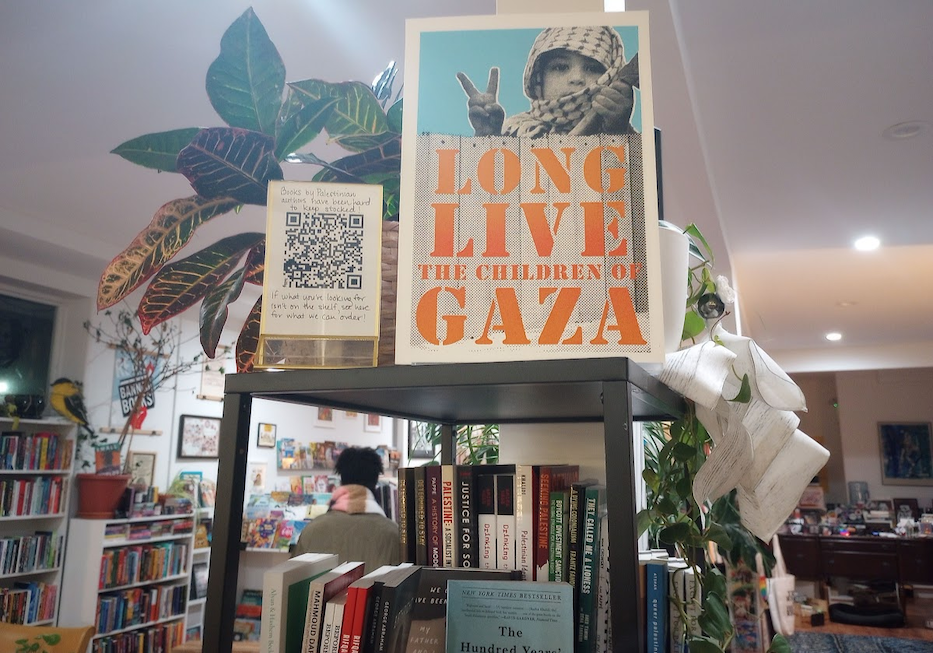
All proceeds from the book will go towards supporting queer and trans Palestinians and on-the-ground work in occupied Palestine. They cited that financial need has risen dramatically for Palestinians trying to leave Gaza in search of safety. The price to cross the Rafah Border Crossing between southern Gaza and Egypt, for instance, currently translates to upwards of $7,000 per person regardless of age. This cost is especially a barrier for marginalized groups like queer and trans Palestinians, they said.
Yaffa also noted rising need among queer and trans Palestinians in the diaspora who have faced financial hardship from losing jobs and housing along with emotional harm from doxxing and harassment. Fundraising requests have gone up from a couple hundred dollars to $10,000 to relocate, support themselves, and send funds back to their families.
As they read, Yaffa encouraged attendees to reject narratives that paint all Palestinians in the same violent light. They noted that there are a plethora of identities within the Palestinian experience, including Black, trans, queer, and disabled Palestinians, and that people, particularly allies, must also show up for these different subgroups.
Growing up, they said, no one talked about their family history, and there existed a lot of unprocessed grief. Only later in life did they become more connected with their identity and feel safe enough to express the fact that they are Palestinian.
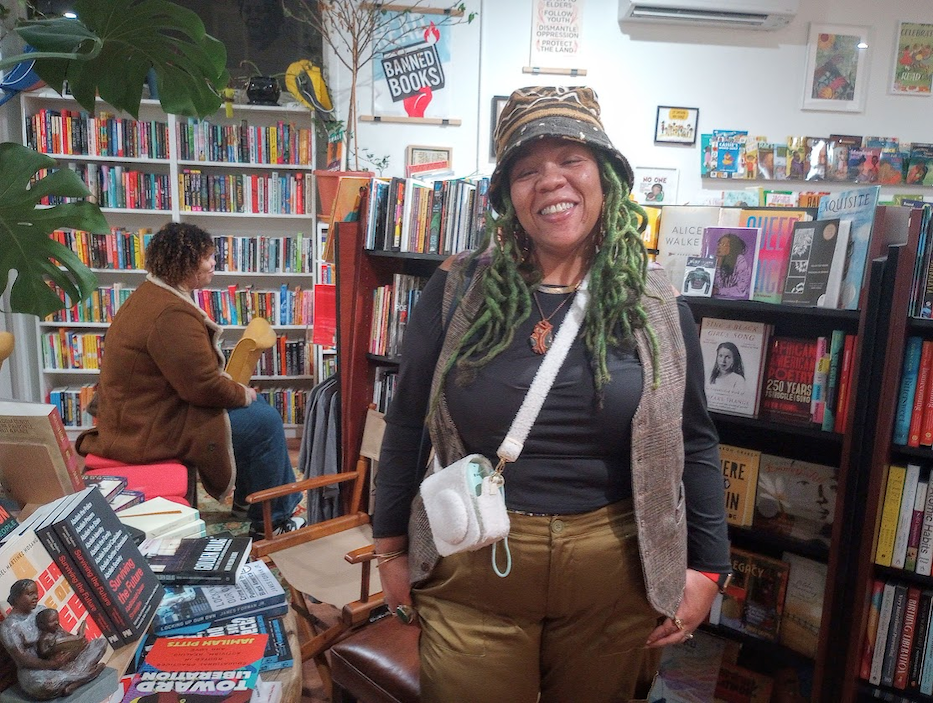
Ala Ochumare-Harris, co-founder of Black Lives Matter New Haven (BLMNHV).
Yaffa has lived in nine countries, but has never been to Palestine. “That’s the displacement that we’re talking about,” they said. They also have relatives on their father’s side from Sudan and from Armenia on their mother’s side, both countries which currently are or previously have experienced genocides. “We’re so interconnected with that pain,” they said.
When the names of all the people that were killed in Gaza were released by the Gaza Health Ministry, Yaffa shifted through the list. They discovered that over 100 of their mother’s cousins had died, and was the one to break the news to her. In total, Yaffa has lost 182 family members since the war began. They called on audience members to consider: “What is your role in the movement?”
Among the audience members was Ala Ochumare-Harris, co-founder of Black Lives Matter New Haven (BLMNHV). They said that they were moved by the tie between Black and Palestinian liberation. “I often tie our work here that we have to do to Palestine, and what has been going on in Palestine before October. It was a sad realization that I’ve been right in saying that stuff.” Ochumare-Harris appreciated Yaffa’s push to encourage people to step into roles within activism, wherever their superpower lies.
Fellow BLMNHV co-founder Sun Queen chimed in that she appreciated Yaffa’s message of uplifting the “most marginalized of the marginalized.”
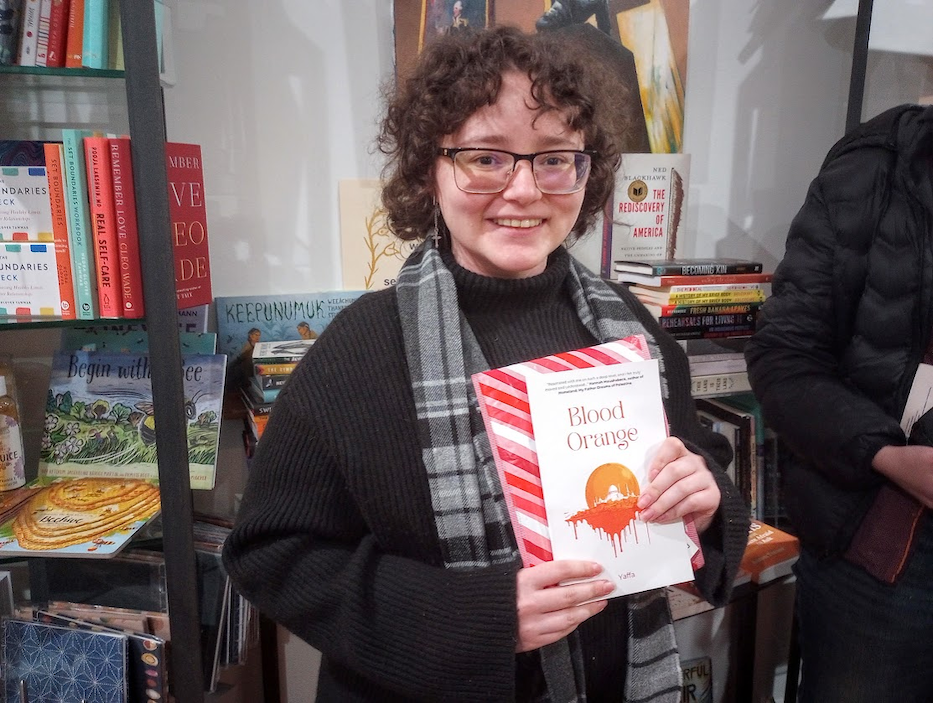
Adrian Drzewucki.
Another attendee, Adrian Drzewucki, wanted to come see Yaffa since they had already preordered the book and promoted it via their Trans Book Tuesday series on TikTok. “Ever since everything in October began, I have actually redirected my series to really highlight trans Palestinian authors because it’s really important to emphasize that trans people are everywhere. It’s not a new concept, and we matter,” Drzewucki said.
When Peer Pride reached out to Possible Futures about if they were interested in being the host space on Yaffa’s book tour, Anderson said it was an “automatic yes” to create space for Palestinian voices and also support poets.
“To be able to have an event with a displaced, queer, trans Palestinian poet is just a tremendous opportunity for our community to come together around art and expression and at a time when people are also really looking for spaces to come together and make sense of what’s happening in the world,” Anderson said.
While Possible Futures has long carried books by Palestinian authors, Anderson added that she feels encouraged that more people are now seeking out books by Palestinian authors.
Physical copies of Blood Orange are available at Possible Futures on 318 Edgewood Ave, New Haven. Yaffa’s next project is compiling and editing a Queer and Trans Palestinian Utopia Anthology to envision a better future through essays, short stories, poetry, and visual art. Submit work by January 7th here.

